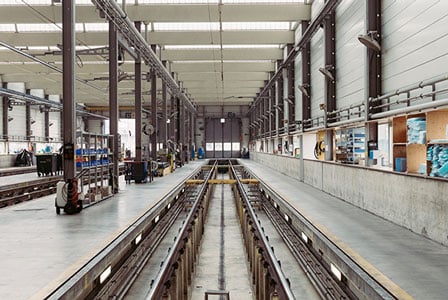
Industrial floor coatings have many benefits that can all be obtained as long as the industrial floor coating installation process follows best practices. Without knowledge, discipline, patience or thoroughness, an industrial floor coating will fail prematurely or not give the expected level of performance.
To educate our audience on how the professionals go about installing an industrial floor coating in order to maximize performance, here are seven of the best practices they follow:
Start with a Clear Floor
Floor coating application can be isolated to a section of a room or building, but attempting to apply the coating around stationary objects is generally a bad practice. With coatings that avoid obstructions, there are more edge points for the underlying concrete or the coating itself to fail prematurely. Site owners are strongly encouraged to remove all possible equipment, structures and other impedances if possible.
Ensure the Floor Is Completely Clear of Other Substances
Industrial floor coatings are designed to bond strongly with textured, porous concrete surfaces. If an existing coating or contaminant is present, the bond will be weak or will not occur at all. If overcoating an existing coating is the selected choice of your application, make sure the new coating is compatible with the existing coating and that the existing coating is surface prepared to the coating manufacturer’s recommendations.
A Clean Floor Equals a Strong Coating
Similar to the point above, dirt, grease, oils and other contaminants can penetrate the concrete surface and cause bonding failure. Make sure all existing coatings and other contaminates are removed before starting the priming process, and in some cases before surface preparation begins. If a contaminant is present and not removed or neutralized prior to surface preparation, it may be spread to other uncontaminated areas or driven further into the surface during the surface preparation. Thorough cleaning through the use of degreasers, detergents, steam cleaning equipment or even a simple broom can greatly improve the surface quality before application begins.
The Surface Must Be Relatively Even
While industrial floor coating application involves creating a ground texture to promote bonding, other irregularities must be dealt with or else they harm the conditions needed for a strong, long-lasting bond. Cracks should be filled, and the surface must be close to level to prevent issues like ripples or pooling.
Weak concrete can pose a similar problem, so site owners may have to resurface their concrete floors if the substrate is crumbling. Otherwise, the coating bond will be stronger than the concrete itself, leading to spalling.
Humidity and Extreme Temperatures Are Your Enemy
Concrete retains moisture more readily than most people assume, especially in humid climates like the Southeast. Relative humidity must be rigorously tested throughout the application environment. Problematic areas may require drying machines or at a minimum a stable climate before coating.
Extreme hot or cold temperatures may not affect the bonding process as much as humidity will, but they can prolong curing to an inconvenient point. Sites that are not air conditioned may require temporary systems to maintain the ideal temperatures for curing.
Is Diamond Ground Surface Preparation The Way to Go?
Acid etching is inconsistent and unreliable. Shot blasting, though a great way to surface prepare a floor, in some instances may be too aggressive and cause substrate weakness in some concrete environments or allow the blast pattern to show through with a thin film coating system. Diamond grinders provide the consistency, reliability and ideal profile needed for thin film systems.
Let Your Industrial Floor Coating Cure!
Depending on the type of coating used, it can take anywhere from several hours to days before the surface completely cures. Fortunately, most coatings can abide foot traffic before completely curing, but heavy machinery, equipment and other stressors could damage uncured floors. Always consult with your professional floor coating installer to learn how to care for your floor coating, its curing time and which practices are needed to prolong its lifespan.
CPC Floor Coatings uses all of these best practices to deliver a beautiful, high-quality and high-performing floor coating with every job. Learn more by viewing our industrial floor coating process.

